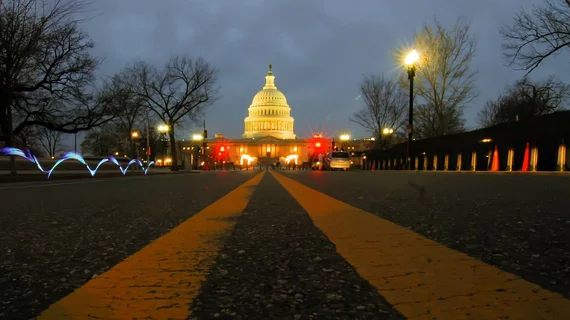Key mammography protections in year-end spending bill uncertain after Trump criticizes legislation
The year-end spending bill passed Monday by Congress includes key protections to mammography coverage under the Affordable Care Act. President Trump last night, however, threatened to veto the legislation if lawmakers did not make certain amendments unrelated to healthcare policy.
The 2021 Consolidated Appropriations Act extends the moratorium on controversial United States Preventative Services Task Force breast cancer screening guidelines by one year, pushing the date back to Dec. 31, 2022.
This new legislation continues to recognize 2002 USPSTF guidelines calling for screening every one-to-two years beginning at age 40, rather than the task force’s 2009/2016 recommendations for biennial screening at age 50.
The American College of Radiology and Society of Breast Imaging both praised the move.
“We are grateful for the congressional champions who have worked tirelessly to extend the current moratorium on the ill-advised USPSTF recommendations,” Dana Smetherman, MD, chair of the ACR Breast Imaging Commission, said in a statement. “Loss of coverage for annual screening mammograms for women starting at age 40 would be devastating to the health of women. Loss of insurance coverage could have a particularly negative impact in underserved areas where screening is less frequent.”
A prior ACR task force analysis found that nearly 6,5000 additional women in the U.S. would die from breast cancer each year if the 2009/2016 USPSTF guidelines were adopted. And many more would be forced into increasingly complicated and costly treatments than if their disease were spotted earlier via mammography screening.
Radiology advocates rejoiced Monday when Congress decided to include a $3 billion injection to the Medicare Physician Fee Schedule that would mitigate potentially devastating reimbursement losses for radiologists. The American Society for Radiation Oncology also applauded lawmakers’ decision to delay the start of the radiation oncology advanced payment model.
But President Trump has thrown these gains into limbo with a video he posted on Twitter Tuesday night criticizing the year-end legislation and calling on lawmakers to increase direct payments to Americans to $2,000.
Congress overwhelmingly approved the coronavirus relief bill in a 92-6 vote in the Senate and 359-53 vote in the House.

